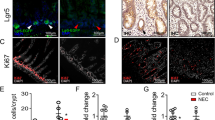Abstract
Necrotising enterocolitis (NEC) is characterised by severe mucosal loss and therefore gastrointestinal (GI) cell proliferation is essential for survival, epithelial repair and recovery of function. Trefoil peptides play a key role in epithelial restitution and repair, and we previously reported a down-regulation of these peptides in NEC. Oral administration of epidermal growth factor has a protective effect in a rat model of colitis. These observations raised the question of a link between the pathogenesis of NEC and decreased mucosal cell proliferation. This study investigates the pattern of mucosal cell proliferation in the GI tract of fetuses, normal neonatal controls, infants with NEC and those recovering from NEC. Parents of neonates up to 44 weeks’ gestation undergoing laparotomy and bowel resection were approached for consent. Bowel samples from resection specimens, and GI tract extractions from products of conception at termination of pregnancy, were fixed in formalin and then embedded in paraffin blocks. Patterns of small and large bowel mucosal proliferation were assessed by immunohistochemical staining for Ki67. Seventeen foetal and 58 postnatal bowel samples [34 with NEC (22 acute, 12 recovery) and 24 controls] were analysed. The pattern of proliferation seen in the fetus and normal neonate was identical to that in mature bowel. In NEC severe mucosal necrosis was observed, but in viable crypts remaining, there was crypt hyperplasia and a relative increase in the proportion of cells staining positive for Ki67. In those patients recovering from NEC the pattern of proliferation was returning towards the normal range. In those patients with post-NEC strictures the recovery of normal bowel morphology was delayed. In NEC there is massive loss of potential proliferative tissue. The remaining viable tissue shows an increase in proliferative activity in the small and large bowel. Failure of rapid regeneration of functional mucosa may therefore be related to an inability of increased proliferative activity to match the losses from the surface; alternatively there may be rapid production of immature, short-lived cells. This study shows that the proliferative response, although present, is insufficient to rapidly reverse the mucosal insult observed in NEC.




Similar content being viewed by others
References
Cairnie AB (1967) Cell proliferation studies in the intestinal epithelium of the rat: response to continuous irradiation. Radiat Res 32:240–264
Day DW, Jass JR, Price AB, Shepherd NA, Sloan JM, Talbot IC, Warren BF, Williams GT (2003) Morson and Dawson’s gastrointestinal pathology, 4th edn. Blackwell, Oxford
Dvorak B, Halpern MD, Holebec H, Williams CS, McWilliam DL, Dominguez JA, Stepankova R, Payne CM, McCluskey RS (2002) Epidermal growth factor reduces the development of necrotizing enterocolitis in a neonatal rat model. Am J Physiol Gastrointest Liver Physiol 282:G156–G164
Hanson WR, Osborne JW, Sharp JG (1977) Compensation by the residual intestine after intestinal resection in the rat. I. Influence of amount of tissue removed. Gastroenterology 72:692–700
Hsueh W, Caplan MS, Qu X-W, Tan X-D, de Plaen IG, Gonzalez-Crussi F (2002) Neonatal necrotising enterocolitis: clinical considerations and pathogenic concepts. Pediatr Dev Pathol 6:6–23
Longman RJ, Thomas MG, Poulsom R (1999) Trefoil peptides and surgical disease. Br J Surg 86:740–748
Lucas A (1997) BPSU British Paediatric Surveillance Unit annual report. Commun Dis Rep CDR Wkly 7:453–456
McCormick D, Chong H, Hobbs C, Datta C, Hall PA (1993) Detection of the Ki67 antigen in fixed and wax embedded sections with the monoclonal antibody MIB1. Histopathology 22:355–360
Podolsky DK (1999) Mucosal immunity and inflammation. V. Innate mechanisms of mucosal defense and repair: the best offense is a good defense. Am J Physiol 277:G495–G499
Podolsky DK (2000) Mechanisms of regulatory peptide action in the gastrointestinal tract: trefoil peptides. J Gastroenterol 35:69–74
Scott RJ, Hall PA, Haldane JS, van Noorden S, Price Y, Lane DP, Wright NA (1991) A comparison of immunohistochemical markers of cell proliferation with experimentally determined growth fraction. J Pathol 165:173–178
Shin CE, Falcone RAJ, Stuart L, Erwin CR, Warner BW (2000) Diminished epidermal growth factor levels in infants with necrotizing enterocolitis. J Pediatr Surg 35:173–177
Taupin D, Podolsky DK (2003) Trefoil factors: initiators of mucosal healing. Nat Rev Mol Cell Biol 4:721–734
Vieten D, Corfield A, Carroll D, Ramani P, Spicer (2005) Impaired mucosal regeneration in neonatal necrotising enterocolitis. Pediatr Surg Int 21:153–160
Wong WM, Wright NA (1999) Cell proliferation in gastrointestinal mucosa. J Clin Path 52:321–333
Wright NA, Watson AL, Morley A, Appleton D, Marks J (1973) Cell kinetics in flat (avillous) mucosa of the human small intestine. Gut 14:701–710
Wright NA, Elia G, Pike C (1990) Induction of a novel epidermal growth factor-secreting cell lineage by mucosal ulceration in gastrointestinal stem cells. Nature 343:82–85
Acknowledgements
We would like to thank Miss. Sharman Chater for assistance with the immunostaining and Dr. Amanda Williams for help with the statistical analysis and creation of the figures.
Author information
Authors and Affiliations
Corresponding author
Rights and permissions
About this article
Cite this article
Vieten, D., Corfield, A., Ramani, P. et al. Proliferative response in necrotising enterocolitis is insufficient to prevent disease progression. Ped Surgery Int 22, 50–56 (2006). https://doi.org/10.1007/s00383-005-1588-1
Published:
Issue Date:
DOI: https://doi.org/10.1007/s00383-005-1588-1




